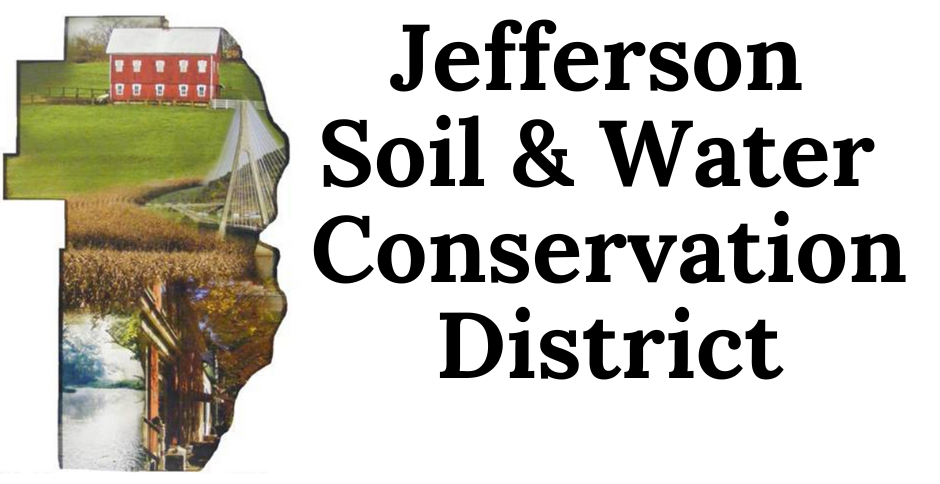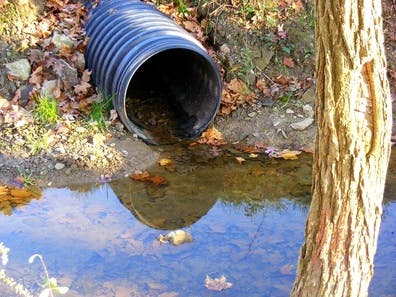Public Involvement & Participation
Minimum Control Measure #2
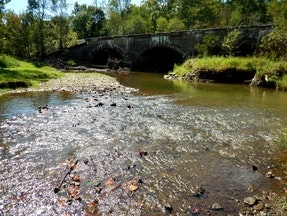
A single regulatory agency or municipal office working alone cannot be as effective in reducing stormwater pollution. There has to be participation, partnership, and combined efforts of other groups in the community all working towards the same goal. The point of public involvement is to build on community capital, the wealth of interested citizens and groups, to help spread the message on preventing stormwater pollution, to undertake group activities that highlight storm drain pollution, and contribute volunteer community actions to restore and protect local water resources.
There are several ways that you can get involved in reducing stormwater polliution and making a direct impact on water quality including volunteer monitoring, reforestation programs, stream cleanup & monitoring, rain barrels, the installation of a rain garden, and more!
Call the Jefferson Soil and Water office to find out more on how you can help!
Rain Gardens
Does your backyard garden keep water clean, help to alleviate drainage and flooding problems or recharge the ground water supply? If your answer to identifying any of these functions is no, than you might be interested to hear that a rain garden established in your yard is your solution to reducing pollution coming from your property. There is also additional benefit to installing a rain garden-they provide habitat and food for wildlife such as birds and butterflies all the while enhancing the beauty of individual yards and communities. Rain gardens are built in depressions built to capture and filter storm water runoff coming from places around homes and businesses such as rooftops, driveways, and parking lots.
Rain Gardens in Jefferson County

A local institution of learning has recognized the opportunity to solve a maintenance issue, create an attractive landscape area and ultimately protect the environment. The grounds and maintenance department of Franciscan University of Steubenville has long-identified a large wet area of lawn on the campus that could only be mowed during very dry times of the year. David Owens, Grounds Manager, explains that “it was difficult to maintain the site which has high visibility being situated between student housing and academic buildings”. His strategy was to install a rain garden in that location that would act like a sponge and natural filter to clean the water and let it drain slowly into the surrounding soil. The garden will also reduce the amount of pollutants from entering into the local waterways through storm drainage systems which flow untreated to our local streams, lakes, and the Ohio River.
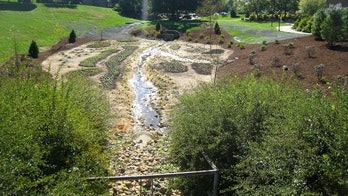
Discussions and planning began in the fall of last year. Owens consulted with staff from Jefferson Soil and Water Conservation District (JSWCD) on the selection of trees and native perennials to plant. Native plants generally grow well and require little care because they have long- been established in the local environment and will produce a better quality flower, seed, or fruit for small mammals, birds and butterflies. Plants are also chosen for their ability to tolerate wet soil conditions. Owens and students from the University’s biology department began the installation this spring and finished at the end of September. The students will continue to monitor the growth and survival rates of the plants.
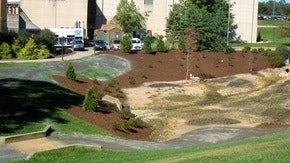
JSWCD staff and Owens met recently at the rain garden site outside of the J.C. Williams Center to discuss the renovated section. He shared that “developing a rain garden at the site seemed to be the right answer in many ways. The garden is an attractive campus landscape area, will tackle stormwater issues, and will provide a data collection opportunity for the students. It’s a win-win situation.”
For information on planning, designing and installing a rain garden contact our office.
Links and other info for Homeowners and Landowners
10 Things You Can Do to Prevent Stormwater Runoff PollutionMake Your Home the Solution to Stormwater PollutionRain Garden ManualWater Efficient Landscaping ManualOffice of Compliance Assistance and Pollution Prevention
Stormville - Animated Guide to Stormwater Pollution Prevention
Rain Barrels
Rain Barrels are an inexpensive and practical means of collecting rain water, and reducing stormwater runoff from invidual homes. A rain barrel is typically comprised of a downspout diverter, and a container to collect and store the water. Many hardware stores sell barrels that are ready to be used, but a frugal homeowner can also make a rain barrel out of a food grade container or a new trash can.
To learn more about rain barrels, visit ths helpful page from the US EPA.
